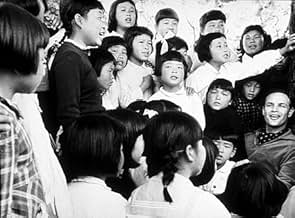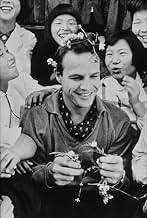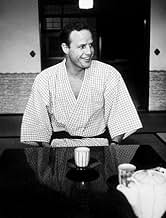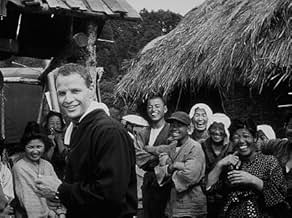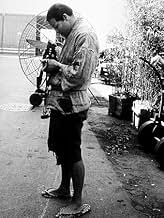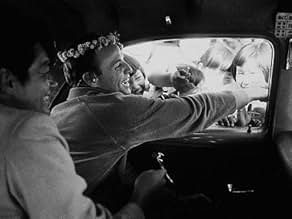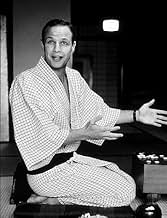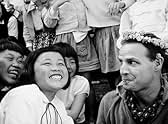IMDb RATING
6.6/10
3.9K
YOUR RATING
In post-WWII Japan, an American captain is brought in to help build a school, but the locals want a teahouse instead.In post-WWII Japan, an American captain is brought in to help build a school, but the locals want a teahouse instead.In post-WWII Japan, an American captain is brought in to help build a school, but the locals want a teahouse instead.
- Awards
- 1 win & 9 nominations total
Machiko Kyô
- Lotus Blossom
- (as Machiko Kyo)
Harry Morgan
- Sgt. Gregovich
- (as Henry {Harry} Morgan)
Carlo Fiore
- Soldier
- (uncredited)
John Grayson
- Soldier
- (uncredited)
Harry Harvey Jr.
- Soldier
- (uncredited)
Miyoshi Jingu
- Old Woman on Jeep
- (uncredited)
Roger McGee
- Soldier
- (uncredited)
Dansho Miyazaki
- Sumata's Father
- (uncredited)
Minoru Nishida
- Mr. Sumata
- (uncredited)
Aya Oyama
- Daughter on Jeep
- (uncredited)
Featured reviews
For a guy who had some heavy duty roles,Waterfront,Sreetcar etc. this role was a real challenge for Brando and he is fabulous and steals movie although Glenn Ford is great too. This shows Brando's brilliance as an actor not that there was ever any doubt but this early in his career to take this comedic challenge shows his versatility. Is Glenn Ford ever bad? I don't think he gets the credit for all his talent. This movie probably could not be made today a victim of PC. Must have Asian play Asian and don't offend the the Japanese although the only people made to look like fool were the Americans which is fine with me because it's a comedy and people are suppose to look foolish. Never on, but caught on TCM.
I just had the chance to see this charming movie again in widescreen format in what evidently is a new or restored print on Turner Classic Movies, and I'm realizing that I love the flick more and more each time I see it. The wonderful cast - Glenn Ford, Paul Ford (ironic - no relation!), Eddie Albert, Marlon Brando and Harry Morgan - do a fine job of playing out the movie's humorous meditation on culture clash, and the ability of a strong but flexible people to maintain their Eastern ways in the face of Western "aid". Brando, in particular, is surprising; this is about as far from Stanley Kowalksi or Terry Malloy as you can get, and one would not think him able to do much with a humorous, cross-racial characterization, yet the brilliant and convincing manner in which he pulls it off reminds us of the great thespian talent he once possessed and which he tended to squander as his life progressed. I believe this film had its origins in a very successful stage play; we can thank the forces involved for committing this funny, charming, and ultimately heart-warming story to celluloid. Best line: "I've come to a state of gracious acceptance somewhere between my ambitions and my limitations."
This film made me realize how much we've lost as a country since the 1950s. According to Wikipedia at least, the book, play, and film were enormously popular for about 25 years, when political correctness set in, and liberals were oh-so-terribly aghast at Marlon Brando playing an Okinawan with a heavy accent. But it's Brando's character who is the most admirable in the movie -- sharp, perceptive, and cunning, but also warm, generous, and forgiving.
All told, it's the Okinawans who come off well -- it is we Americans who seem rather ridiculous, with our notions of winning hearts and minds and spreading democracy. Remember that this film was made just ten years after WWII, when we were up against the Soviet Union, and democracy and "the American way" were at the heart of what we thought we were all about. But here is a film that completely satirizes, if not ridicules, all that, and yet it was enormously popular.
Perhaps I'm looking at it through rose-tinted lenses -- there may well have been the Michael Savages and Rush Limbaughs of the day who inveighed against the Hollywood liberals seeking to undermine American resolve in the face of the Soviet threat and disgracing the memory of those who had died in WWII.
But I think, more accurately, it was a time of greater American self- confidence, when we were able to laugh at ourselves more easily, and weren't terrified that this, that or another group might be ticked off.
In short, this is a wise movie that should be seen by all those in power who have anything to do with how we conduct ourselves toward other nations and peoples -- as well as anyone who wants to see an entertaining but also educational film.
All told, it's the Okinawans who come off well -- it is we Americans who seem rather ridiculous, with our notions of winning hearts and minds and spreading democracy. Remember that this film was made just ten years after WWII, when we were up against the Soviet Union, and democracy and "the American way" were at the heart of what we thought we were all about. But here is a film that completely satirizes, if not ridicules, all that, and yet it was enormously popular.
Perhaps I'm looking at it through rose-tinted lenses -- there may well have been the Michael Savages and Rush Limbaughs of the day who inveighed against the Hollywood liberals seeking to undermine American resolve in the face of the Soviet threat and disgracing the memory of those who had died in WWII.
But I think, more accurately, it was a time of greater American self- confidence, when we were able to laugh at ourselves more easily, and weren't terrified that this, that or another group might be ticked off.
In short, this is a wise movie that should be seen by all those in power who have anything to do with how we conduct ourselves toward other nations and peoples -- as well as anyone who wants to see an entertaining but also educational film.
I have spent many years on Okinawa and am always amazed at Brando's ability to create a character (Sakini) that is true to the Okinawan character. I have watched it many times over and enjoy it every time. When I'm asked why I visit Okinawa so often, I usually loan them my copy of "Teahouse" and wait for a response. It is a story of a resilient and happy people who have retained their culture, through many invasions. Brando's monologue at the beginning and end of the film masterfully explains it all. The kids will like it and adults should get a laugh while watching the arrogant victors being steered to the Okinawan's needs in a hilarious manner. It's not quite history and it's not quite fantasy, but it's all good fun.
This movie was the first chance to see Marlon Brando in a truly comical role, not the "He Man"-unbelievably good! His accent, his body movements, the Japanese he spoke, hard to believe this was the same man who did the Waterfront.I really think he deserved an award for this role. These were a couple of the most enjoyable hours I've ever spent. Having lived in Okinawa, and familiar with the practical, down-to-earth people there, I enjoyed the movie that makes so much fun and caricatures narrow-mindedness and pompousness while exalting creativity, adaptation, and "what really matters". The movie does make fun of the narrow-mindedness of some Americans, and shows the Okinawans with respect and tenderness, as assertive, business-minded, resilient, and proud. A real quality movie, and I'm so glad I taped it from Turner Classic movies.10 out of 10.
Did you know
- TriviaProduction began with Louis Calhern playing Col. Purdy, but Calhern died after more than a month of filming. Paul Ford was quickly recruited, as he had created the role on Broadway, and this resulted a revived career for the lovable, irascible character actor.
- GoofsWhile Fisby and Sakini are finishing up their first address to the villagers Sakini asks Fisby what time it is. He responds that it's a quarter to 5:00. But the sun is directly over their heads as if it were noon.
- ConnectionsFeatured in Okinawa: Keystone of the Pacific (1973)
- SoundtracksSakura Sakura (Cherry Blossoms)
(uncredited)
Written and Arranged by Kikuko Kanai
Sung by Lotus Blossom
Details
- Release date
- Country of origin
- Languages
- Also known as
- The Teahouse of the August Moon
- Filming locations
- Production company
- See more company credits at IMDbPro
Box office
- Budget
- $3,926,000 (estimated)
- Runtime2 hours 3 minutes
- Sound mix
Contribute to this page
Suggest an edit or add missing content

Top Gap
By what name was La petite maison de thé (1956) officially released in India in English?
Answer

